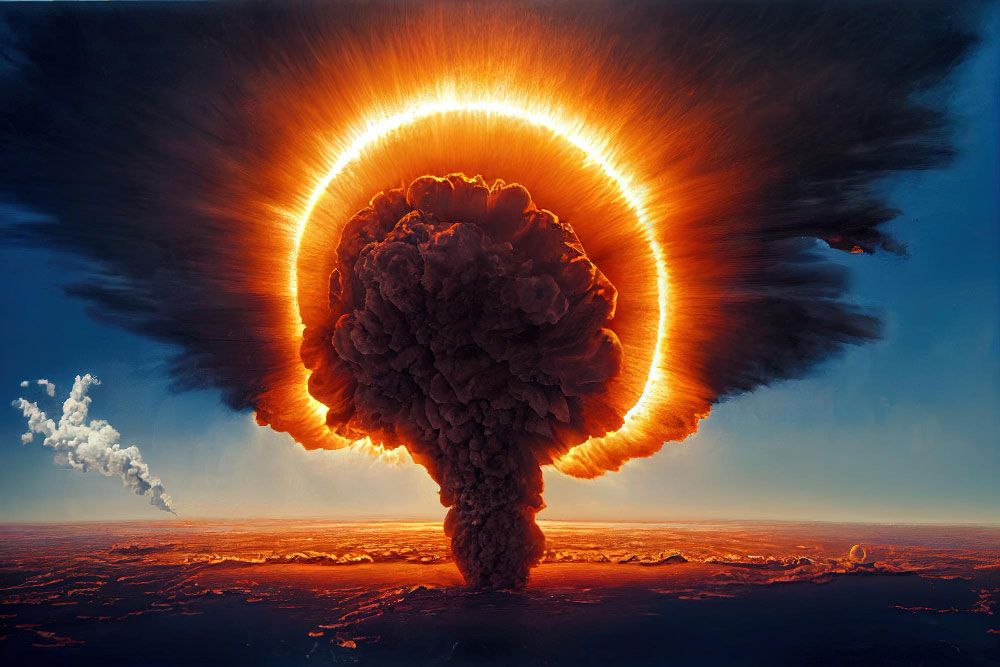Many people are aware of the tragedies of the twentieth century brought to humanity by world wars. Millions of people suffered and died needlessly, concentration camps showed us for what atrocities humans are capable of and atomic bombs thrown on Hiroshima and Nagasaki fittingly closed this dark chapter in the history of our species.
But what most people doesn’t know is that we were, on at least two occasions, on the brink of thermonuclear disaster after that, during a period when, at least in the western world, there was peace and prosperity while the two most powerful nations at that time, USA and SSSR, were in a so-called Cold war. The reason why that never happened was not because those in charge simply decided that throwing nukes on each other is not a good idea, but because two men, for some reason, decided not to follow orders.
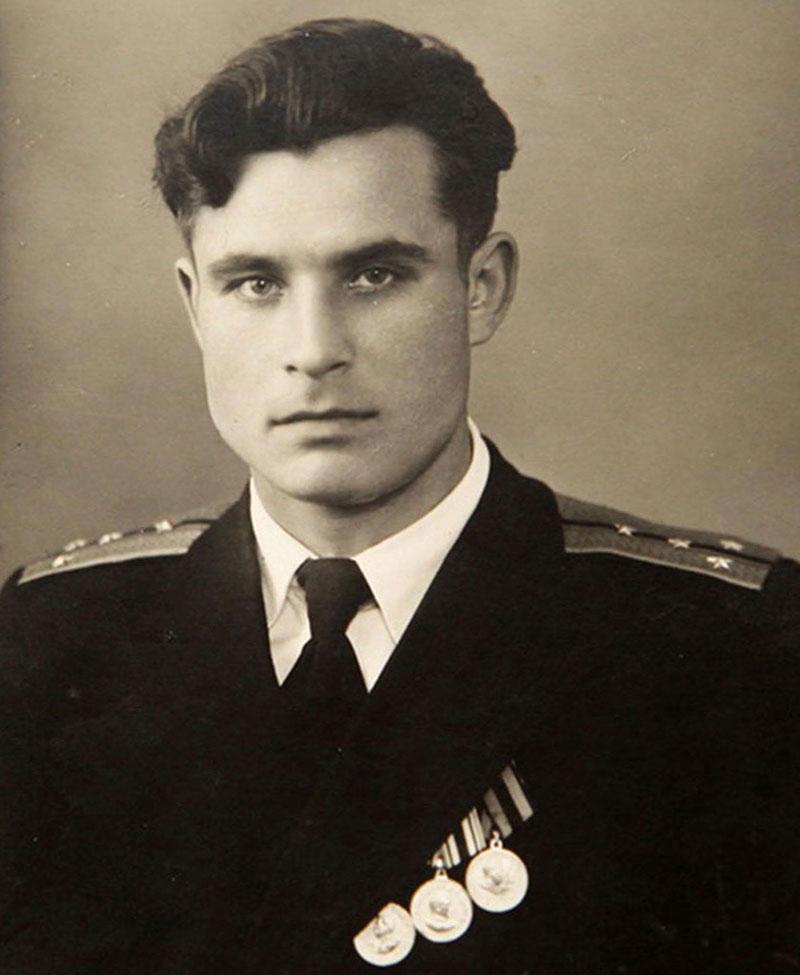
The first of the two was a Soviet Navy officer, Vasili Arkhipov, a man credited with preventing a Soviet nuclear strike during a Cuban Missile Crisis, an attack that likely would have caused a major global thermonuclear response.
On 27 October 1962, during the Cuban Missile Crisis, a group of 11 United States Navy destroyers and the aircraft carrier USS Randolph located the diesel-powered, nuclear-armed Foxtrot-class submarine B-59 near Cuba. Despite being in international waters, the United States Navy started dropping signaling depth charges, explosives intended to force the submarine to come to the surface for identification. There had been no contact from Moscow for a number of days and, although the submarine’s crew had earlier been picking up U.S. civilian radio broadcasts, once B-59 began attempting to hide from its U.S. Navy pursuers, it was too deep to monitor any radio traffic. Those on board did not know whether war had broken out or not. Unlike the other submarines in the flotilla, three officers on board B-59 had to agree unanimously to authorize a nuclear launch: Captain Savitsky, the political officer Ivan Semonovich Maslennikov, and the chief of staff of the flotilla (and executive officer of B-59) Arkhipov.
Typically, Soviet submarines armed with the “Special Weapon” only required the captain to get authorization from the political officer to launch a nuclear torpedo, but due to Arkhipov’s position as chief of staff, B-59‘s captain also was required to gain his approval. An argument broke out, with only Arkhipov against the launch. Even though Arkhipov was second-in-command of the submarine B-59, he was in fact chief of staff of the submarine flotilla, including B-4, B-36 and B-130. According to author Edward Wilson, the reputation Arkhipov had gained from his courageous conduct in the previous year’s K-19 incident also helped him prevail. Arkhipov eventually persuaded Savitsky to surface and await orders from Moscow. This effectively averted the general nuclear war which probably would have ensued if the nuclear weapon had been fired. The submarine’s batteries had run very low and the air conditioning had failed, causing extreme heat and high levels of carbon dioxide inside the submarine. They were forced to surface amid the American pursuers and to return to the Soviet Union as a result.
In 2002, Thomas Blanton, who was then director of the US National Security Archive, said that Arkhipov “saved the world”.
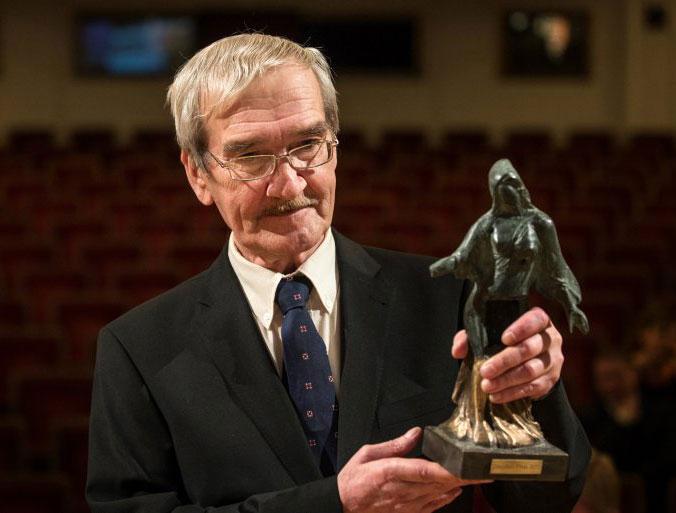
The second man that made a fortunate decision in a moment of great pressure was Stanislav Yevgrafovich Petrov, a lieutenant colonel of the Soviet Air Defence Forces. He played a key role in the 1983 Soviet nuclear false alarm incident.
On 26 September 1983, three weeks after the Soviet military had shot down Korean Air Lines Flight 007, Petrov was the duty officer at the command center for the Oko nuclear early-warning system when the system reported that a missile had been launched from the United States, followed by up to five more. Petrov judged the reports to be a false alarm, and his decision to disobey orders, against Soviet military protocol, is credited with having prevented an erroneous retaliatory nuclear attack on the United States and its NATO allies that could have resulted in a large-scale nuclear war which could have wiped out half of the population of the countries involved. An investigation later confirmed that the Soviet satellite warning system had indeed malfunctioned. Because of this incident, Petrov is often credited as having “saved the world“.
When I first heard about these two men through my friend, naturally, I checked their biographies to find out whether their dates of birth are known and fortunately they are. After that, as I usually do, before entering their dates in my astrology software I began to wonder and hypothesize what should I expect to see in their charts. I adopted this method very early in my astrological research, because it is, in my opinion, one of the most reliable methods to determine what every planet and sign, without any doubt, represent or symbolize. Furthermore, almost nothing is more satisfying for an astrologer than when concrete examples confirm a preconceived hypothesis.
Since these two men „saved the world “, or more precisely, made a decision in a pressurized situation that was beneficial to the lives of all of us, my first thought was that their charts must contain some combination or aspect between Sun and Jupiter, since Sun symbolize life and also decision making, while Jupiter symbolize everything that is beneficial to us and, therefore, always represent the archetypal figures of protectors and saviors.
As can be expected, their time of birth is unknown, which is unfortunate, but despite that, the position of planets on the day of their birth and transit of planets on the time that they made those fortunate decisions are, as will be seen, quite revealing.
Vasili Arkhipov (30.1.1926) was born in Zvorkovo, one of the districts of Moscow Oblast.
Unsurprisingly, Sun is in conjunction with Jupiter in his chart. It is significant that both planets don’t receive any influence from other planets, i.e., they form no aspects towards other bodies, which means that nothing influences them to express what they should, to save (Jupiter) lives (Sun). What is also significant is that both planets are placed in the sign of Aquarius, which, as a sign in which the Sun is in detriment, represent rebellion against authority. For that reason, he was the only one of three officers that refused to obey the command, and in that way, as it turned out, saved the world.
NATAL CHART Vasili Arkhipov
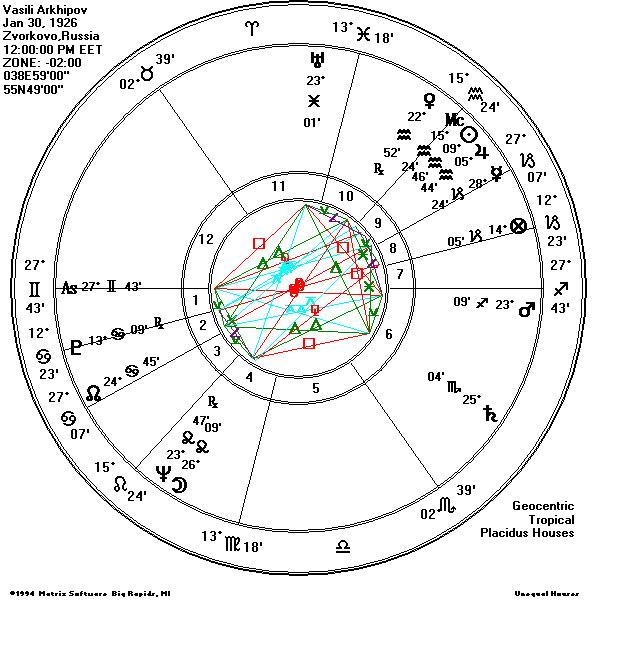
What further helped him to make such a decision, without him knowing, was the position of planets on October 27th 1962. On that day the Sun transited through the sign of Scorpio and was positioned on 3° of that sign, which, taken by itself, was not an indication of a good decision, since Sun was not only in the sign that symbolizes death, but on the exact degree of the Fall of the Moon. Since Sun represent authority, those that are in command, they made an order that would bring death and destruction (Scorpio) to a lot of people (Moon). But fortunately, on that day, Jupiter was on a 2° of Pisces and, therefore, in trine with Sun. Since Jupiter was in a sign in which it have strong dignity, his beneficial influence overpowered potentially destructive tendency of Sun placement. And it overpowered that tendency through a man who has those same two planets in conjunction in his chart.
NATAL CHART Cuban Missile Crisis
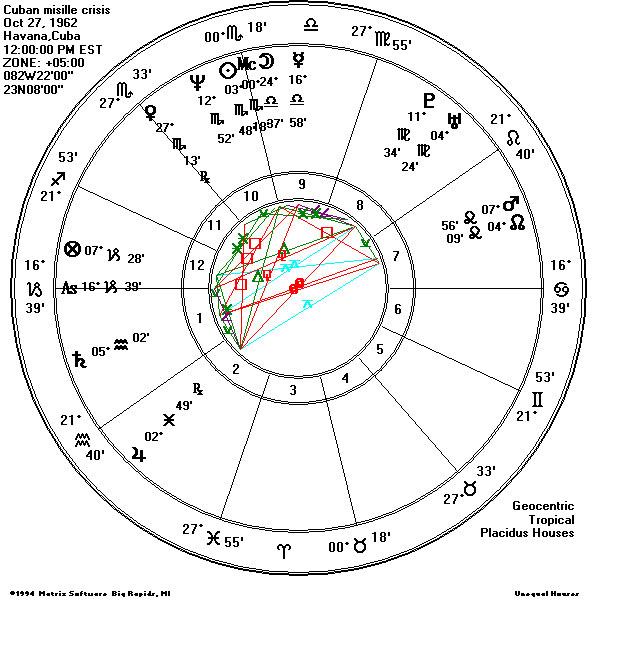
So, this fact should be emphasized. The man who have Sun in conjunction with Jupiter in his chart, two planets that together represent an urge, motivation to save lives, did it on a day when those two planets were in trine.
Stanislav Yevgrafovich Petrov (7.9.1939 Vladivostok), the other savior, was born on a day when Sun was in a sign of Virgo, and his Sun, interestingly, have no connection to Jupiter whatsoever. Well, it doesn’t necessarily have to, since his Sun, placed on 13° of Virgo, is in exact conjunction with Venus, a planet that also have positive influence and is the most beneficial planet after Jupiter, known also as the „lesser benefic”.
NATAL CHART Stanislav Petrov
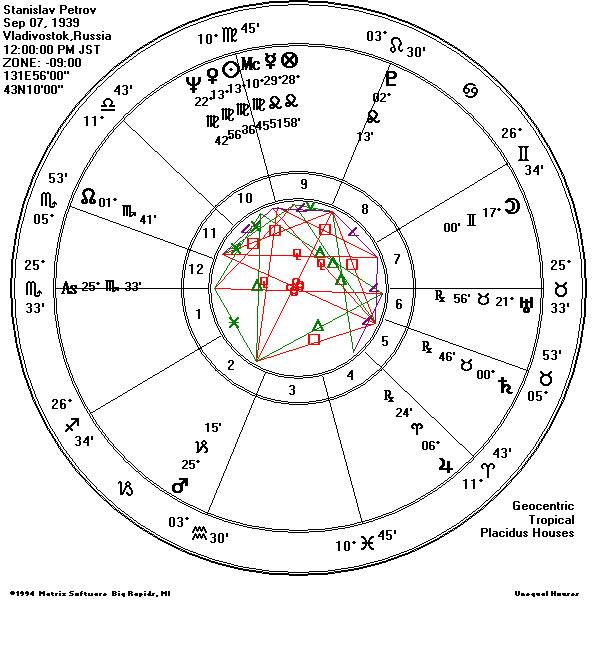
Beside this conjunction, the most interesting aspect in his chart is an almost exact trine between Uranus in Taurus and Neptune in Virgo. As a reminder, he was involved in 1983 Soviet nuclear false alarm incident. Well, it is precisely these two planets that symbolizes false (Neptune) alarm (Uranus). Since these two planets are in trine, a harmonious aspect which is, by the way, in the nature of Jupiter, he recognized that the alarm was false and responded positively (trine) to it, paradoxically, by not responding and, therefore, preventing a disaster.
As noted, the incident happened on 26.9. 1983. Positions of planets on that day are, to say the least, instructive. Just as on a day of a previous incident, one planet was placed on a 3° of Scorpio, and that planet was Saturn. Also, not surprisingly, Sun and Jupiter were again connected, with a difference that on the day of a false alarm incident, Sun, placed on a 2° of Libra was in sextile with Jupiter and Uranus on a 5° of Sagittarius.
NATAL CHART False alarm incident
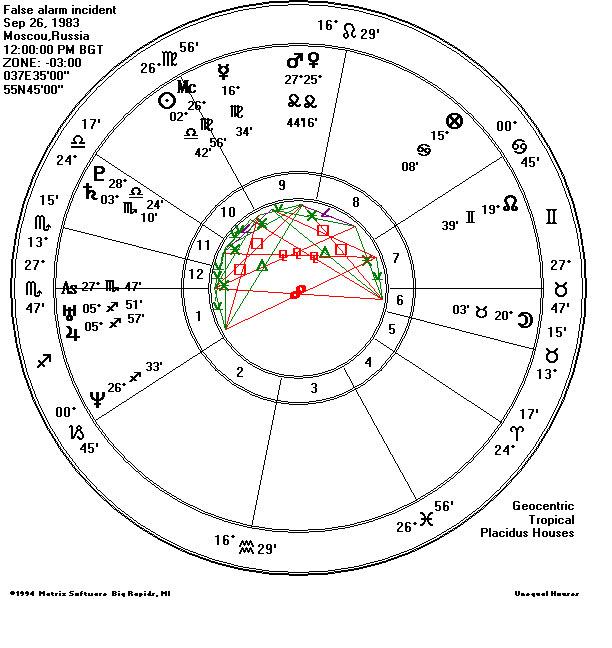
At this point, it should again be emphasized what these two men have in common. Besides both being, obviously, males, they were both Russians. Furthermore, both have Sun placed in one of the human signs, one in Aquarius, the other one in Virgo and both have Sun in conjunction with planets that have the most beneficial influence, Jupiter and Venus respectively.
And not only that, on both days those incidents took place, which are more that 20 years apart, Sun was in a harmonious aspect with Jupiter, forming trine in transit chart of the first and sextile in transit chart of the second event. And in both cases, Jupiter was placed in signs in which it has strong dignity, or rather rulership, Pisces and Sagittarius.
I don’t know about you, but those are too many coincidences for my taste.
We should, of course, celebrate these two men, but we also shouldn’t fell too optimistic about future of our species, since the only reason we are not living in a post-apocalyptic nightmare right now are because two men with fortunate charts were at the right place and right positions on two very fortunate days. Next time we may not be that lucky.

